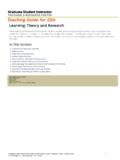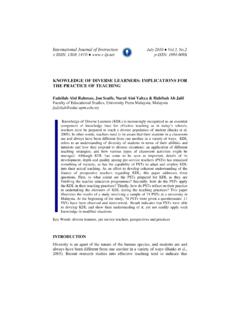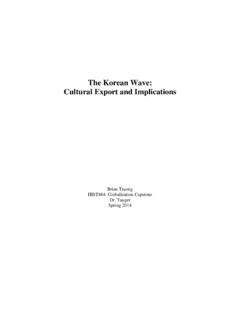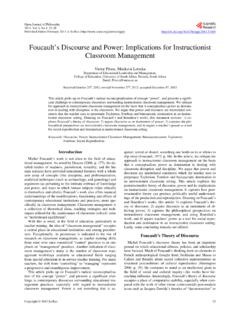Transcription of Understanding the Problems of Transition into Higher Education
1 339 Understanding the Problems of Transition into Higher Education Helen Crabtree, Carole Roberts, University of Salford and Christine Tyler, Education Consultant Abstract This paper reports on a study which compares the teaching of business and business related subjects in one English university and a number of associated tertiary (post-16) colleges. The research was carried out to explore similarities and differences in the teaching and learning environments in these two sectors in order to gain a better Understanding of why some students appear to find it difficult to make the Transition into university. This comparative study forms the first part of an ongoing project intended to improve retention and achievement of first year undergraduate students who move directly from level 3 qualifications in school or college into university. While the research focuses in particular on business and business-related qualifications, the results of this study are likely to be of wider interest to those involved with first year undergraduate students, irrespective of subject or discipline of study.
2 Background to the Study Changes in post compulsory educational policy over the past decade have placed increasing emphasis on the concept of widening participation and lifelong learning. These changes are underpinned by the need to provide equality of opportunity for groups which are under represented in tertiary and Higher Education (such as ethnic minorities and lower socio-economic groups) but are also driven by the need to develop workers with the appropriate knowledge and skills required to support national economic development (Parker 2003, Leitch Report 2006, HEFCE 2006). As a result, the government s aim is to encourage more young people to remain in Education beyond the school leaving age and to increase the level of participation in Higher Education in England, with a target of fifty per cent of those aged between 18 and 30 by 2010. Within English universities, the majority of students still enter university at 18 or 19, straight from school or college.
3 However the increased emphasis on widening participation has already resulted in increased student numbers and an increase in student diversity. This has created Problems for both academic staff and students. Thus university lecturers have commented on the challenges presented by mixed ability groups or groups from a range of different backgrounds or experiences and the lack of time and resources for student support activities and have expressed concerns about students attitudes and motivation (Ottewill and Macfarlane 2003, Hayward et al 2006). There is increasing concern about high levels of student withdrawal, particularly during the first year of the undergraduate programme (Harvey et al. 2006). Recent reviews of research on barriers to widening participation in Higher Education (Gorard et al. 2006) and the first year student experience (Harvey et al. 2006) have identified a range of issues which have been studied in connection with the problem of student retention and achievement.
4 These include the importance of social and academic integration, the mismatch between student expectations and experiences, lack of appropriate academic study skills and the importance of student support.(Gorard et al. s findings were that there is a slow movement towards equity in the system) Findings are mirrored by research carried out within the University of Salford which has identified the importance of self concept and personal support systems as a factor in student persistence into the second year of undergraduate programmes (Roberts et al., 2003) and the value of programme based activities which facilitate and promote social and academic integration as part of the student s early experience (Trotter and Roberts, 2006). In the case of academic integration, this latter study identified the importance of active student-centred teaching and learning activities and ongoing summative assessment. However Crabtree (2006) subsequently demonstrated that even under these circumstances many first year business students failed to engage effectively with the process, appeared to be unaware that independent learning was a requirement for success in Higher Education and lacked many of the skills necessary for effective independent study.
5 (See work by Entwistle) Both Gorard et al. (2006) and Harvey et al. (2006) comment on the limitations of approaching this situation from the perspective of student deficit and suggest that it might be more useful to investigate the situation from the perspective of the Transition and adjustment into Higher Education . This seems logical since research has shown that students are likely to base their expectations and learning strategies on their previous educational experiences (Vermunt 1998, Cook and Leckey 1999, Kember 2001, Hibbert 2006)). A review of the literature has identified a number of issues which might affect the student teaching and learning experience in college and university. One such factor is the nature of the qualifications delivered. In 340the college environment these include level 3 vocational qualifications (such as BTEC National and AVCE awards and the new A level in Applied Business), which are assessed primarily by means of coursework assignments, and the more academic A levels which are assessed predominantly by unit based examinations, often based on preseen or unseen case studies (see for example National Database for Accredited Qualifications, Merrills 2003).
6 In 2001 an Ofsted report on the first year of implementation of Curriculum 2000 noted that students studying for revised A level qualifications had fewer opportunities for independent work than before and QCA reports in 2002, 2003 and 2006 drew attention to the heavy workload associated with both A level and AVCE qualifications. Further Torrance et al (2005) concluded that the move towards increased clarity of assessment criteria and processes has resulted in increased instrumentalism and that there is a tendency for the achievement of assessment outcomes to become a substitute for real learning. Similar information on the effect of programmes of study is not available for the university sector but it is evident from the literature that the nature or purpose of the university course could be a factor which influences teaching practice and may influence the teacher s conception and perception of their role. Thus Entwistle (2005) highlights the emphasis which many university lecturers place on ways of thinking and practising rather than the acquisition of subject knowledge and in the case of the business curriculum Macfarlane and Ottewill (2001) and Edmunds and Richardson (2005) have highlighted the tension which exists between theoretical knowledge ( study of business ) and knowledge as it works in practice ( study for business ).
7 Another factor of particular relevance to the college teaching and learning environment is the effect performance management systems have had on organisational culture and practice. Thus Ball (2003) has noted that the use of measures of performance to monitor and maintain standards in Education (known as performativity) is actually changing the nature and practice of teaching and James (2005) reported that the strong link between qualifications and funding in FE colleges may have inhibited the introduction of improvements in teaching practice and the value of outcomes for learners. Although the literature raises a number of issues which are likely to affect the student experience in college and university, available empirical information is patchy and incomplete. This makes it difficult to formulate a view on the specific Problems which students will face when making the Transition from college to university. The research outlined in this paper provides a direct comparison of the teaching and learning environment in the two sectors and considers the implications for student learning careers.
8 Methodology The starting point for this study was a desire to understand if there are significant differences in the teaching and learning environment in college and university and if so whether this could provide another part of the explanation for why some students find it difficult to make a successful Transition into Higher Education . The methodology employed (grounded theory) is derived from a social constructivist philosophy which focuses on the importance of Understanding how people make sense of their situation rather than seeking an objective statement of reality (Easterby-Smith 2002), and involves the collection of qualitative data and the analysis of this in order to gain a better Understanding of the situation and to explore underlying attitudes, assumptions and beliefs which influence practice. Data was collected by interviewing eight college tutors from four Sixth Form colleges (SF) and four Further Education colleges (FE) in the Greater Manchester area and ten university staff from the University of Salford, Business School.
9 All had experience in the management and delivery of business related qualifications. (Further background information about the tutors and institutions involved in this study are shown in Appendix 1). Candidates were nominated by managers and then contacted directly by a member of the research team to explain the purpose of the study and to ask if they were willing to participate. In order to facilitate access and frank discussion about the issues affecting practice, interviews with college and university tutors were conducted by a member of the research team with specific, recent experience of working in that sector. Thus the interviews of college tutors and university tutors were conducted by different members of the team. In order to ensure a measure of consistency, the same set of open questions was used by both interviewers. These asked about participants background and experience and explored issues relating to programme aims, teaching roles and responsibilities, teaching practice, the students role, guidance and support provided and the main constraints which influenced practice.
10 Interviews were recorded and the tapes were used by the interviewer to clarify and supplement notes taken during the conversation. The resulting 341transcripts were returned to the participant to ensure that they accurately reflected their views before any further analysis took place. Data were analysed by reading and rereading all the transcripts in order to be familiar with the content, identifying common themes and then using these as the basis of a comparison of the two sectors. The outcome of this comparative analysis was also shared with participants in order to test the conclusions drawn. These findings were then used to identify factors which might impact on effective Transition and which will be followed up in subsequent studies. Findings Analysis of the interview transcripts identified some similarities and a number of differences between the responses of college and university tutors which are summarised in Appendix 2.





